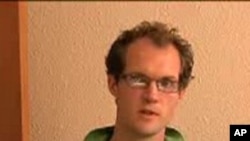More than three months into a political crisis in Honduras, business leaders are starting to feel the pain. Owners say the dispute between ousted President Manuel Zelaya and the interim government is scaring off new investment and creating other problems.
"This is the Tegu Honduras factory," explains U.S. entrepreneur Chris Haughey. He has high hopes for his fledgling toy manufacturing company in Tegucigalpa.
"We have our woodworking machinery here. We are making wooden toys," Haughey says.
After doing social work with street children in Honduras, Haughey chose to locate his new business in the country. That was before President Manuel Zelaya was removed from power in June.
Since then, protests in support of the ousted president and against him have shut down the capital several times. Mr. Zelaya, who has sought refuge in the Brazilian embassy, is demanding to be returned to office. In an effort to curb violence, the interim government has imposed curfews and other restrictions.
Many Hondurans have tried to return to their normal routines. Haughey says he has seen nothing so far to deter his toy manufacturing. But recent curfews have created some problems.
"When you have a curfew that extends into the work day or even into the evening, say five or six o'clock, it affects businesses because they have to shut down and send the workers home," he notes.
Under intense pressure, the interim government has backed away from the curfew. Haughey says many businesses view the interim government as more friendly than Zelaya's administration.
"It is hard to know whether or not what is going on right now has delayed things [business] or sped them up," Haughey says. "There were massive bureaucratic and administrative delays under the Zelaya administration."
Mr. Zelaya's critics accuse him of eroding protections to business and pushing the country toward socialism. His supporters blame the interim government for launching a coup that is scaring away foreign investment.
Economists say it is too early to estimate losses. Political scientist Eduardo Gamarra of Florida International University says there is no doubt the economy is suffering.
"In countries like Honduras, those kind of hits are very difficult to make up," Gamarra says.
In Miami, Honduran businessman Gerardo Padilla puts his losses at nearly a half million dollars in canceled contracts so far.
"Micheletti, he is not going to pay me. Mr. Zelaya is not going to give me my money back. What do I need to do to keep my business stable in coming months?" asks Padilla.
Padilla blames both sides for the crisis affecting his company which makes and exports garbage trucks to Honduras. He says buyers are canceling purchases and other investments because of the uncertainty.
"If I were in their position, I would make the same decisions they are making," Padilla says. "I would cancel deals to avoid investing in a country that offers me no security at all."
Padilla says it may take months to rebuild trust in the Honduran economy. In the meantime, many business leaders are likely to delay new investments until the crisis passes. Real estate developer Karen Bush hopes new elections scheduled for November will repair foreign confidence.
"We want to convince the international community to just accept our elections and allow us to continue and move to the next page," says Bush.
That may be a difficult task. The United States and other nations have warned they will not recognize the vote unless the political crisis is resolved. Diplomats in Tegucigalpa aim to reach a deal between the interim government and the ousted leader as soon as possible.




